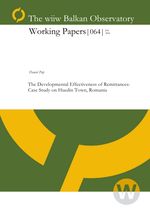The Developmental Effectiveness of Remittances: Case Study on Huedin Town, Romania
Relying on survey data from Huedin, a town in Romania, we seek to provide an empirical evidence for the hypothesis according to which remittances could have either a positive or negative developmental impact at community level. For this, we inquire about the perceptions of migratory processes with focus on the possible effects of remittances in the local economy. Our first finding is that residents share a common view on the reasons of migration, namely that it has been triggered by the large pay levels that exists between the level of local and the Western European labor markets and that migration opportunity was enhanced by the lifting of visa requirements for Schengen countries. We have also found that remittances constitute a significant source of liquidity inflow and that the ways in which repatriated earnings were spent have influenced the performance of the local economy. We conclude that a reinterpretation of migration is required in order to capture the investment and entrepreneurial aspects of the phenomenon. In the formal model proposed in Appendix 2, we make a first attempt to conceptualise migration as a sector of the local economy in which migrants are entrepreneurs, who invest in migration activities to produce the composite commodity remittance.
Keywords: Remittances, migration, development, Romania
JEL classification: F22, O15, O16
Countries covered: Romania
